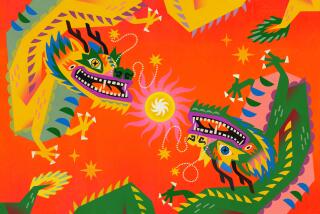Crowing in the New Year : As the Year of the Cock begins, we’re edging closer to the dragon of a new century. To whom will this year belong?
- Share via
No matter where I’ve lived, East Coast or West Coast, I can always count on my mother to pick up the telephone and draw a metaphorical red circle on my well-thumbed “Men of USC” calendar.
“Don’t forget Chinese New Year is Saturday, and try not to swear on that day, OK?”
“OK.”
“And think good thoughts.”
“OK, OK.”
“And don’t forget to clean house.”
“I said, OK.”
While I may chafe at the motherly advice, I really do appreciate the reminder. The lunar new year is one milestone I have never been able to figure.
The problem is that Chinese New Year never falls on the same date or day as it did the year before. Only Chinese elders are privy to knowledge of the exact date, and it is not because they assiduously mark the rise and fall of the lunar orbit.
They know the date by going to a favorite noodle house, the herb apothecary or maybe the local specialty market, where they collect an assortment of calendars from overseas. After a quick consultation, they spread the word.
Technically, Chinese New Year is the second new moon after the winter solstice, floating somewhere between Jan. 21 and Feb. 4 on the present-day Gregorian calendar. I know this because last week, I looked it up in the encyclopedia.
Now consider a second complication--the 12-year zodiac cycle. Is it the Year of the Rat? The Tiger? The Rabbit? Again, it was my mother who informed, “The Chinese newspaper says, it’s the Year of the . . . you know . . . Cock.” Just say rooster, Mom.
In stories, Buddha or the Jade Emperor or the Ruler of Heaven asked all the animals of the world to report on the past year. Only 12 heeded the call, arriving in the following order: rat, ox, tiger, rabbit, dragon, snake, horse, sheep, monkey, cock, dog and boar.
According to tradition, people born in a particular animal year have characteristics of that animal. Fortunes also may be told, strengths and weaknesses revealed. To compute your animal year, you need to count backward to the year you were born. The order in which the zodiac animals appear in all cycles is always the same.
It may also help to know that the year 2000 will be the Year of the Dragon and 1900 was the Year of the Rat. Then again, it may not help at all.
All these animals seemed rather picturesque and pastoral to me, maybe even exotic to others, but not much else. After all, one still had to go to school and there was no time off from work. So what kind of legitimate holiday could it be?
And no wonder I wondered. In the textbooks of my youth, I saw no mention of Chinese New Year whatsoever. Instead, there was the Egyptian, the Greek, the Babylonian, the Aztec, the Mayan, the Roman calendars. No Chinese calendar.
Most books back then dismissed the lunar calendar as inexact, off by a whole month from the 365.25-day solar year. It was an inferior method to the present and universal Gregorian calendar, or so I thought.
But, I am happy to report, times have changed. Not only does the encyclopedia list Chinese New Year under a separate heading, but it also offers an account in historical context. To my surprise, the Hebrew and Muslim calendars also have taken their rightful places.
Reading this, I am reminded that the present calendar is no Mr. Science either. Calendars that work must contain arbitrarily fixed dates to cut the confusion as well as suit civic and ceremonial demands. Jan. 1, for example, was established by Julius Caesar. The Julian calendar was used into the Middle Ages, even though it sometimes put spring observances like Easter smack in the middle of summer.
So Pope Gregory XIII came along in the late 16th Century and fixed that by cutting 10 days from 1582 and dropping three days every 400 years. Furthermore, years ending in two zeros would not be leap years, except when the first two digits were divisible by four.
Huh? And I thought the lunar calendar was confusing.
Ironically, the Gregorian has been the official calendar in China and Japan for more than 50 years. But observances of the lunar new year are still the most popular and considered the most important, here as in the Orient.
Personally, I like to count my days as suggested by a playwright. To paraphrase Herb Gardner: You got to know your own days, and name them, every single one of them, or else the years go by, and none of them belong to you.
P.S. Chinese New Year is tomorrow.
More to Read
Sign up for The Wild
We’ll help you find the best places to hike, bike and run, as well as the perfect silent spots for meditation and yoga.
You may occasionally receive promotional content from the Los Angeles Times.






